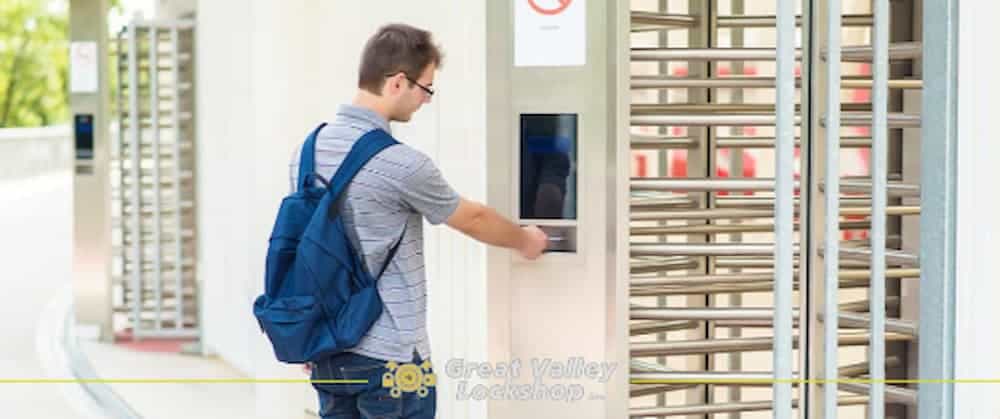
Advantages of Campus Access Control Systems for Colleges
Universities are responsible for protecting students, staff, and their properties. With thousands of doors requiring security, relying on traditional keyed locks is ineffective.
Traditional locks no longer provide the necessary level of security as ways of crimes and misconduct have evolved. Keyed locks have flaws and easily break. In addition, other security controls, such as barricading doors, violate other safety codes.
As such, more and more institutions are turning to using access control systems.
Access control technology and keyless locks can work together to secure all the buildings on campus. This includes dormitories, educational buildings, classrooms, and all other student areas.
Below, we discuss the critical advantages of using campus access control systems as security solutions.
Key Takeaways
- Campus access control systems provide increased security, lower maintenance costs, scalable solutions, remote management solutions, and integration for more effective security.
- Conducting a comprehensive risk assessment is critical to identify the most suitable control system for universities and college campuses.
- Great Valley Locks provides a thorough audit of campus security systems and can help you migrate to more advanced and secure security solutions.
Advantages of Access Control Systems for Campuses
Universities are responsible for protecting students and staff, educational facilities, records, equipment, and more all around the campus. With thousands of doors requiring security, relying on traditional keyed locks is ineffective.
Traditional locks no longer provide the necessary level of security as ways of crimes and misconduct have evolved. Keyed locks are flawed and easily broken, while other security controls, such as barricading doors, violate other safety codes.
Access control technology and keyless locks can work together to secure all the buildings on campus. This includes dormitories, educational buildings, classrooms, and all other student areas.
Below, we discuss the critical advantages of using campus access control systems as security solutions.
Increased Security
With traditional locks, a single misplaced dorm key or master key is an instant security threat to faculty, staff, and students. Additionally, if a door is propped open, entry traffic can no longer be restricted. Administrators at colleges are quickly realizing the benefits of having secure entry points and recorded entry data in dorms, classrooms, offices, and athletic facilities.
First, automatic locks with spring-loaded latches maintain safety in case someone forgets to close or lock the door. Then, access control systems can be updated when an access card is reported lost or stolen, blocking the use of that user’s unique card. Security managers can also disable or suspend users’ access privileges whenever they are considered a threat.
More advanced student housing electronic locks have more capabilities. These solutions can have real-time reporting of all campus members entering and leaving a facility. Access control systems for college and university campuses can restrict access for unauthorized individuals.
Lower Security Maintenance Costs
One of the critical flaws of keyed lock systems is that they require a physical key to allow entry. Once lost, access to a particular facility is completely restricted. The next thing to do in this situation is to get a key replacement.
Key replacements are costly and time-consuming to manage. Considering that the door lock must also be rekeyed or changed for security purposes, this process becomes even more expensive.
With a keyless access system, colleges don’t need to deal with the cost of key replacements. Once the lost or stolen card has been deactivated, the student or staff member can be issued a new keycard or fob with new access credentials.
The risk of losing keys is completely removed in more advanced systems, like biometric-powered locks. Students and faculty members can use fingerprints or mobile credentials to access a particular location. Although installation of these system upgrades may be a bit costlier at the beginning, they are more cost-effective in the long run.
Easy to Install and Scale
Larger universities appreciate the fact that access control systems are flexible and scalable. Administration can replace old locks with proximity readers on one building at a time, as the budget allows. Wireless access control systems are straightforward to install, with limited hardware and wiring involved. They can be quickly added to new or existing university facilities without interruption to daily activity.
These systems can easily adapt to the evolving needs of a campus. Access control systems are scalable, whether adding new buildings, expanding facilities, or integrating additional features. They can be seamlessly extended to accommodate growth without significant reconfiguration. This feature ensures that the security infrastructure is effective as the campus evolves over time.
Remote Management
An access control network can be integrated across a large college campus or multiple campus locations. Then, this articulated network can easily be overseen remotely from the security headquarters. Authorized personnel can gain access from a central control access system.
Access permissions, alarms, and traffic reports can be managed in real-time, streamlined, and unified ways. This feature also removes the need to check each lock for security manually.
Administrators can manage access control remotely while maintaining safety. Managing system upgrades can also be done through central control access.
Integration With Other Systems
Another good thing about access control systems is their compatibility with integrations. This feature makes it easier for campus administrators to create a seamless security system.
Some campus entry systems can easily integrate with HR databases to update access permissions automatically. Visitors can be given limited access and automatically logged into the system for recording.
Such integrations can help administrators spread campus guidelines efficiently. This also applies to visitors to satisfy security needs.
Audit Trails and Reporting
Access control systems maintain detailed logs of entry and exit activities. This can help provide a comprehensive audit trail.
This feature can be invaluable in the case of investigations, compliance, and accountability. The recorded data can be used to gain insight into cases of misconduct.
More advanced control systems also provide detailed reports and analysis of the campus security status. This solution can help campuses analyze vulnerable areas and focus resources on fortifying them.
Access control systems have become invaluable in preserving safety on college and university campuses. In 2021, approximately 31,000 crimes occurred on college campuses in the US. Implementing more advanced solutions like access control systems could mitigate most of these crimes.
For these reasons – and many others – college campus administrators are opting for a more effective method of securing doors with keyless control access entry.
Watch this video to learn how one university decided to switch to a comprehensive keyless access system and how it helped increase security on campus.
3 Types of Campus Access Control Systems
Access control systems can be categorized based on the types of locks used, the system’s central command, and others. Each type describes the exact needs of an institution.
Each type of access control system has its advantages and may be suitable for different situations based on the campus’s size, layout, and security requirements.
Below are three common types of access control systems:
- Physical Access Control System (PACS). This type of control system is designed to give an individual access to a particular part of a building guarded by access points, such as doors. Physical access control technology involves the use of physical readers, a control panel, and a form of personal identification.Keys for PACS include pins, key cards, fobs, or biometrics that contain an individual’s credentials. The receiver reads the information from the keys and transmits it to a control server containing the user’s data.
- Electronic Access Control Systems (EACS). EACS utilizes electronic locks that can be controlled remotely. Similar to PACS, electronic access control solutions have a physical lock that controls an access point. Advanced EACS often uses credentials stored in mobile devices to provide convenience and flexibility.Student credentials are stored in an application or virtual keys and are scanned by electronic locks to grant access.
- Network Access Control Systems. This control system is managed through a central administrator that allows them to monitor and access locations across a wide range of locations. NACS works best in managing multiple locks and security systems as all changes and updates are applied in real-time across all locations.This solution provides more sophisticated and controlled access to campus constituents. They can also be further integrated with other security systems, such as video surveillance and alarms.
Many modern access control systems combine elements from these types to create hybrid solutions that offer enhanced security and flexibility. The choice of system depends on the specific needs and budget of the educational institution.
Great Valley Locks offers a wide range of access control solutions that can improve campus security. Our team can introduce you to a more modern take on solutions and install security systems without disrupting everyday activities.
6 Key Considerations When Choosing Access Control Solutions for College Campuses
Before deciding what type of keyless access control system would work best for a university campus, we recommend consulting an experienced locksmith.
In doing so, you will also need to assess all of your operations to identify critical areas properly, and the expert can suggest the most appropriate access control system for your institution.
Here are some crucial considerations when looking at different keyless entry options.
- What is the preferred type of entry device?
- The options include access cards or fobs that operate with proximity readers, keypads, and biometric entry.
- Should both keyed and keyless entry be possible?
- Combination locks can be installed. This is advantageous when a secure master key system is already in place or when traditional keys are required as a backup security measure. Consider an option that will be better for an institution with thousands of members, like a campus.
- How often is access required?
- More robust locks and efficient readers are necessary for high-traffic areas and on frequently used doors. Consider the ergonomics and convenience when choosing the appropriate access control. Locations like classrooms will require constant access, whereas dormitories and residence halls require less.
- How big is the campus portion that requires access control?
- Your chosen access control must be scalable and can accommodate future growth and changes. The system should offer flexibility regarding access levels, especially in a diverse setting such as a campus.
- Would you require integration with other systems?
- This option enables administrators to integrate the access control system with other security solutions seamlessly. Integration enhances the overall campus security by implementing multiple layers of safety measures.
- Is a Lock-out Feature Needed?
- Doors can be tamper-proofed with a type of electronic lock that automatically shuts down after three failed attempts to hack the door code.
With so many features, options, and benefits of keyless locks, there’s no reason not to consider ramping up security on your college campus.
Best Practices for Ensuring Effective Access Control Systems for College Campuses
There are many challenges to achieving effective access control in an educational setting. A very common challenge is known as piggybacking or tailgating. This happens when authorized individuals first enter a building using their access keycard. Then, these users hold the door open or allow others to enter the same door behind them without swiping their cards.
Many see this simply as a polite gesture. It’s a common practice, and most people on a college campus don’t understand the security risks associated with it.
While several challenges are present, there are critical ways that can be done to minimize the effects of such circumstances.
Consider these best practices to ensure an effective access control system on your campus:
- Conduct a thorough risk assessment. This step is mandatory. Begin by analyzing potential security risks on the campus. The results can help you determine the suitable approach and scale of the security system for your institution.
- Define clear access policies. Once you have chosen an access security provider, clearly identify the access policies based on roles. Determine the members who will have access to specific areas.
- Align access control systems with campus regulations. The chosen access control system for campuses must comply with local and national regulations.
- Regularly update access permissions. This step will help you determine if access is still given to individuals who no longer require it and prevent unauthorized entries.
- Conduct a thorough and regular audit of the system. A regular audit can help you identify unusual patterns or suspicious activities. This step can also help you identify potential security breaches, which can be addressed by updating the security system.
- Integrate with other security systems. If possible, improve the performance of your access campus access control by integrating them with other surveillance equipment, such as CCTVs and alarms.
- Train all security staff. All members must be aware of the purpose of the security system. This step includes introducing control policies and methods to recognize threats and address emergencies.
With whatever type of campus access control system you choose, it is always critical that all stakeholders are involved. Students, faculty, and staff must be well-trained and knowledgeable about what the security system is for and how to operate it properly.
By following these best practices, college campuses can establish and maintain an effective access control system that enhances security, protects assets, and contributes to a safe and secure learning environment.
Commercial Locksmith Services – College Keyless Entry Systems
Student safety is always a critical priority for colleges and universities. Great Valley Lockshop has experience installing and maintaining keyless access control systems at some of the largest universities in the nation.
Our team can perform a comprehensive hardware audit on your security system. This is critical before suggesting the most appropriate access control system for your campus. We also walk you through the essential responsibilities of managing your chosen control system and provide lockdown strategies.
Choose from various security systems, including biometrics and other keyless access systems. Protect all campus members and minimize misconduct cases by allowing us to install advanced lock systems on your campus.
Get more information about our campus security services.
Let us assist you with selecting the best locking system to increase security campus-wide. Call us today at (484) 324-2986 or request a quote online.








